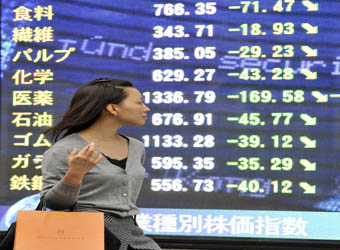The Nikkei 225 erased early gains to slide 0.46 percent. Automakers were mostly lower, as were most blue-chip tech names. Energy-related names were mixed.
Across the Korean Strait, the Kospi surged 1.21 percent, with tech blue-chips and so-called “THAAD-related stocks” contributing to gains. Those stocks include retailers and consumer names that tend to get hit when tensions flare up between China and South Korea over Seoul’s deployment of the THAAD missile defense system. Lotte Shopping extended overnight gains to climb 1 percent, and LG Household jumped 2.62 percent.
Those moves came as South Korean President Moon Jae-in continued with his four-day visit to China. Business executives from major Korean corporations, including Hyundai and LG, are also taking part in the bilateral meeting.
Down Under, the S&P/ASX 200 slipped into the red, edging lower by 0.06 percent. Gains were seen in energy and resource stocks, while real estate investment trusts and utilities slid.
Major miners were mixed, with BHP tacking on 0.29 percent and Fortescue Metals shedding 1.34 percent. Heavily-weighted bank stocks were little changed. The Hang Seng Index was mostly flat, slipping 0.02 percent, as gains in tech and most property names were offset by losses seen in banking stocks.
The Hang Seng Index was mostly flat, slipping 0.02 percent, as gains in tech and most property names were offset by losses seen in banking stocks.
The Hong Kong Monetary Authority announced Thursday it had raised its base rate by 25 bps to 1.75 percent, matching the Fed’s decision to raise the fed funds rate by the same amount.
Mainland markets were largely unaffected after the People’s Bank of China on Thursday raised both the reverse repo rate and medium-term lending facility rate by 5 bps. The Shanghai Composite lost 0.20 percent and the Shenzhen Composite slipped 0.127 percent.
Markets also digested a barrage of data released in the morning. Fixed-asset investment growth came in in line with expectations at 7.2 percent, Reuters said. Industrial output increased 6.1 percent in November, above a forecast of 6 percent in a Reuters poll. Retail sales, meanwhile, rose 10.2 percent last month compared to one year ago, meeting expectations.
MSCI’s broad index of shares in Asia Pacific excluding Japan was up 0.56 percent at 12:45 p.m. HK/SIN.
The Fed raised interest rates by a quarter point on Wednesday, in a move that was widely expected by markets. That increased the central bank’s target range to between 1.25 percent and 1.5 percent.
Also of note, the Federal Open Market Committee raised its GDP forecast from 2.1 percent to 2.5 percent. Its inflation forecast was raised from 1.6 percent to 1.7 percent.
U.S. consumer prices released on Wednesday had shown an acceleration in November, with the CPI rising 0.4 percent. The core CPI, which excludes food and energy prices, rose just 0.1 percent from a month ago.
Although concerns about inflation saw U.S. Treasury yields decline on Wednesday in the aftermath of the FOMC’s decision, some market watchers were unfazed about the central bank’s rate hike path.
“The Fed has hiked three times this year despite tame wage and inflation numbers. The central bank can therefore be expected to do the same next year, especially if the economy continues to grow robustly and the financial sector remains stable,” Tamur Baig, chief economist at DBS Bank, said in a note.
Meanwhile, House and Senate Republicans came to a tentative agreement on their tax plan. The deal will cut the corporate tax rate to 21 percent, CNBC reported earlier.
The dollar was broadly lower following those developments, with the dollar index coming in at 93.359 at 12:27 p.m. HK/SIN. That was below the 93.9 handle seen around the end of Asian trade on Wednesday on news that Democrat Doug Jones was projected to win a special Senate election in the deeply conservative state of Alabama.
Against the Japanese currency, the greenback was mostly steady at 112.56 after falling as low as 112.45 in the previous session.
The Dow Jones industrial average posted a record close on Wednesday while the S&P 500 closed just a touch below the flat line as financial stocks declined after the Fed’s latest rate hike.
In other currencies, the Australian dollar got a boost following the release of expectation-topping employment data. The Aussie dollar traded at $0.7665 at 12:28 p.m. HK/SIN, touching its highest levels in more than a month earlier in the day.
Australian department store chain Myer on Thursday indicated its first-half for the 2018 financial year results would be “materially below” the previous corresponding period. The company blamed a decline in foot traffic and industry discounting for the expected fall in profit. Myer shares tumbled 8.28 percent.
Toyota and Panasonic on Wednesday announced an agreement to begin a study to advance the development of automotive batteries. The move comes as other Japanese automakers, such as Nissan and Honda, have warmed to the prospects of electric vehicles. Toyota was off 0.27 percent, while Panasonic rose 2.38 percent.
Shares of Rakuten lost 4.04 percent after the e-commerce company on Thursday said it would be applying to enter the mobile network operator sector.
Mobile services were slated to begin in 2019, Rakuten said in a statement, adding that it aims to target a minimum of 15 million subscribes. Other mobile carriers also traded lower, with SoftBank Group down 3.35 percent and NTT Docomo off 2.48 percent.
Ahead, interest rate decisions are due from the Philippine central bank, while the Bank of England and European Central Bank are scheduled to announce their decisions during the European trading day.
Source: CNBC


